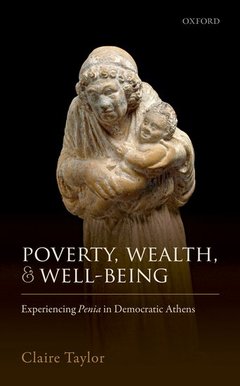Poverty, Wealth, and Well-Being Experiencing Penia in Democratic Athens
Langue : Anglais
Auteur : Taylor Claire

Poverty in fifth- and fourth-century BCE Athens was a markedly different concept to that with which we are familiar today. Reflecting contemporary ideas about labour, leisure, and good citizenship, the 'poor' were considered to be not only those who were destitute, or those who were living at the borders of subsistence, but also those who were moderately well-off but had to work for a living. Defined in this way, this group covered around 99 per cent of the population of Athens. This conception of penia (poverty) was also ideologically charged: the poor were contrasted with the rich and found, for the most part, to be both materially and morally deficient. Poverty, Wealth, and Well-Being sets out to rethink what it meant to be poor in a world where this was understood as the need to work for a living, exploring the discourses that constructed poverty as something to fear and linking them with experiences of penia among different social groups in Athens. Drawing on current research into and debates around poverty within the social sciences, it provides a critical reassessment of poverty in democratic Athens and argues that it need not necessarily be seen in terms of these elitist ideological categories, nor indeed solely as an economic condition (the state of having no wealth), but that it should also be understood in terms of social relations, capabilities, and well-being. In developing a framework to analyse the complexities of poverty so conceived and exploring the discourses that shaped it, the volume reframes poverty as being dynamic and multidimensional, and provides a valuable insight into what the poor in Athens - men and women, citizen and non-citizen, slave and free - were able to do or to be.
Claire Taylor is the John W. and Jeanne M. Rowe Associate Professor of Ancient Greek History at the University of Wisconsin-Madison. Her publications include Communities and Networks in the Ancient Greek World (OUP, 2015), co-edited with Kostas Vlassopoulos, and Ancient Graffiti in Context (Routledge, 2011), co-edited with J. A. Baird. In addition she has published on various topics related to Athenian democracy, women's social networks, and epigraphic evidence as a source for ancient history.
Date de parution : 09-2017
Ouvrage de 336 p.
14.3x22.3 cm
Thème de Poverty, Wealth, and Well-Being :
© 2024 LAVOISIER S.A.S.



